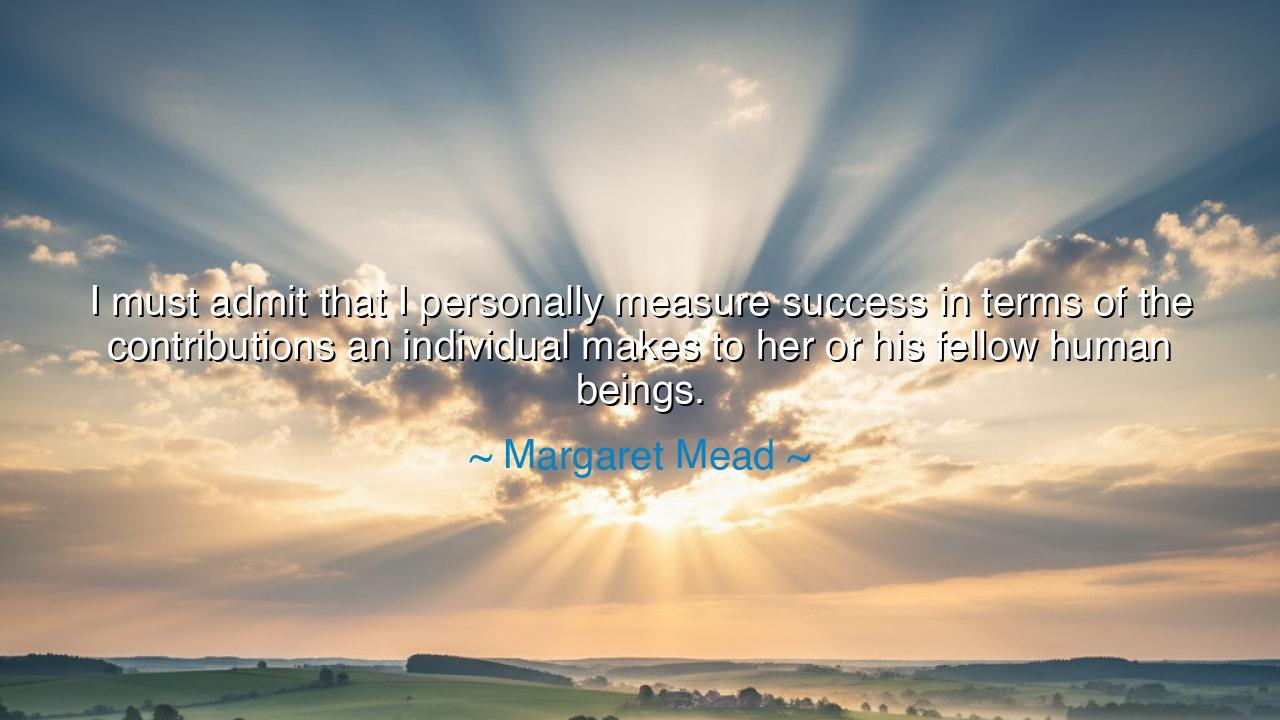
I must admit that I personally measure success in terms of the
I must admit that I personally measure success in terms of the contributions an individual makes to her or his fellow human beings.






Hear, O children of tomorrow, the words of Margaret Mead, the wise observer of humankind: “I must admit that I personally measure success in terms of the contributions an individual makes to her or his fellow human beings.” These words do not praise gold, nor crowns, nor fleeting triumphs. They speak instead of a nobler standard—one that weighs the heart, not the purse; the gift given, not the glory gained. For what is true success, if not the lifting of others, the giving of light where once there was darkness?
This vision springs from Mead’s own path. As an anthropologist, she walked among distant peoples, not to conquer, but to learn. She listened to their songs, studied their customs, and bore witness to their struggles. Through her eyes, the world was reminded that every culture, every tribe, every person carries a wisdom worth honoring. And so she measured greatness not in what one seizes for oneself, but in what one offers to the collective soul of humanity. In her teaching we see a flame that endures: that contribution is the true currency of life.
The ancients, too, knew this truth. Consider Marcus Aurelius, emperor of Rome, who sat upon a throne gilded with power yet measured his reign by the service he rendered. “What is not good for the hive,” he said, “is not good for the bee.” Though he held dominion over legions, he believed his duty was to serve, to contribute, to uphold justice and wisdom for the sake of his people. Thus Mead’s words are not new, but a continuation of an eternal wisdom: that greatness is never self-serving, but always other-serving.
Look also to the life of Florence Nightingale. Born into wealth, she could have chosen a life of ease, yet she walked into the filth and horror of war hospitals, carrying with her the lamp of mercy. Her contribution was not measured in riches, but in the countless lives she healed, the dignity she restored to the suffering, and the path she forged for modern nursing. By Mead’s measure, Nightingale’s life stands as a towering monument of success—a beacon not of accumulation, but of service.
The lesson is this: success cannot be hoarded. It is not the private jewel of the individual but the shared treasure of humanity. To live only for oneself is to live small, but to give, to lift, to heal, to teach—this is to live vast and enduring. A life measured by contribution is a life that continues long after death, echoing in the laughter of those lifted, in the wisdom of those taught, in the courage of those inspired.
Practical action lies before you. Ask not, “What can I take?” but, “What can I give?” Each day, seek a way to contribute—to offer kindness, to share knowledge, to lighten a burden. Begin small, with words of encouragement, with acts of compassion, with service where service is needed. Over time, these small offerings weave into a tapestry of greatness, and your life itself becomes a testament to Mead’s truth.
So let this teaching be carved in your heart: success is not the shadow of wealth, nor the echo of applause. It is the living presence of your contribution to your fellow human beings. Strive for this, and you will not merely succeed—you will belong to eternity. And when your days are finished, your legacy will not be counted in possessions, but in lives touched, hearts lifted, and humanity made brighter because you walked among it.






AAdministratorAdministrator
Welcome, honored guests. Please leave a comment, we will respond soon